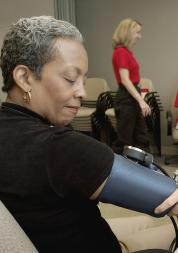Making Local Healthcare Equal: Healthcare Concerns in Black and Asian Communities
Background
We know that ethnic health inequalities have existed for many years, with national data highlighting that Black and Asian people experience significantly poorer health outcomes than their White counterparts.
Health-based inequality sits within the context of wider, societal inequality and the fact that Black and Asian people may experience discrimination in their day to day lives, whether this be in education, employment or other circumstances. This not only impacts their health, but contributes to a mistrust in public bodies and the expectation to be treated unfairly generally. This in turn, alongside their lived experience, impacts their views of the healthcare system.
However, since the Covid-19 pandemic, the severity of this inequality has worsened, meaning it has never been more important to hear directly from those affected, and to ensure that everybody receives the same level of care, regardless of ethnicity.
What we did
We worked closely with Black and Asian community leaders to understand how to best engage with Black and Asian Hertfordshire residents, and to ensure our methodologies were culturally competent and provided a safe space for people to share their views and experiences.
Using their insight and guidance, we ran focus groups, interviews and an online survey to understand Black and Asian people's views towards, and experiences of, local healthcare, and whether they felt local NHS services were responsive to, and respectful of, their cultural, ethnic or religious needs.
In total we heard from 156 Black and Asian Hertfordshire residents.
We also interviewed our local NHS Trusts and Clinical Commissioning Groups (before the establishment of the Hertfordshire and West Essex Integrated Care System) to understand how the NHS was supporting the needs of local Black and Asian communities.
What we found
Although experiences differed, Black and Asian people typically felt that the NHS was not designed to deliver culturally competent care. Respondents shared experiences of not being listened to and feeling discriminated against which, for many, contributed to a lack of trust in the NHS to provide fair and person-centred care.
- 44% of respondents felt that their health was not equally protected by the NHS compared to the health of a White person.
- Mistrust in the NHS stemmed from many places, including their own, or their family and friends' negative lived experience, the disproportionate impact of Covid-19 on Black and Asian communities, and the existence of ethnic health inequalities more broadly.
- 45% of respondents felt they had been discriminated against in a healthcare setting, with many believing this was because of their ethnicity. Experiences included the use of racial stereotypes and mistreatment from healthcare professionals.
- Respondents felt they were not listened to by healthcare professionals and felt their concerns were dismissed, leading to mistrust and a reluctance to engage with healthcare services.
- Respondents felt that healthcare professionals did not always have an adequate understanding of the conditions that primarily affect Black and Asian people, or how conditions may present on darker complexions. In some cases, this led to late or incorrect diagnoses.
- A lack of cultural competency in care meant dietary, language, religious and cultural needs and preferences were not always respected or accommodated for.
What the NHS told us
Although there is a strong commitment from the NHS to tackle ethnic health inequalities, with many initiatives and interventions in place with the intention of reducing disparities, it is clear that more needs to be done to provide equal and fair care to all patients.
- NHS policies and strategies often do not address ethnicity specifically and do not look at the particular needs of Black and Asian communities.
- Training on cultural competency within the NHS is limited and not offered to all staff.
- Language preferences are often not recorded and translation support is not always forthcoming from healthcare professionals.
- Communications often homogenise all ethnic groups by using collective imagery and language such as "BAME".
- The recording and collection of patient ethnicity data by NHS services is inconsistent and is often not used to highlight where disparities may exist for Black and Asian communities.
- The NHS often does not directly engage with local Black and Asian communities, preventing services from understanding their specific needs and what is important ton them.
What happened next
Based on our findings, we made 16 recommendations to Hertfordshire's providers and commissioners, as well as learnings for the Hertfordshire and West Essex Integrated Care System (ICS) and Health and Care Partnerships. The recommendations will work to tackle ethnic health inequalities by:
- Improving the collection and recording of patient ethnicity data to better capture the health outcomes of Black and Asian patients
- Ensuring complaints and feedback systems are more accessible and approachable, enabling Black and Asian patients to feedback with confidence
- Advising on how to build and sustain genuine partnerships with Black and Asian communities
- Ensuring that healthcare professionals are aware of, and responsive to, the cultural needs and preferences of Black and Asian patients
- Improving the recruitment, representation and retention of Black and Asian staff
- Sharing and implementing of good practice across the system
Read the full report and executive summary below
If you need this report in an alternative format, please contact us.

